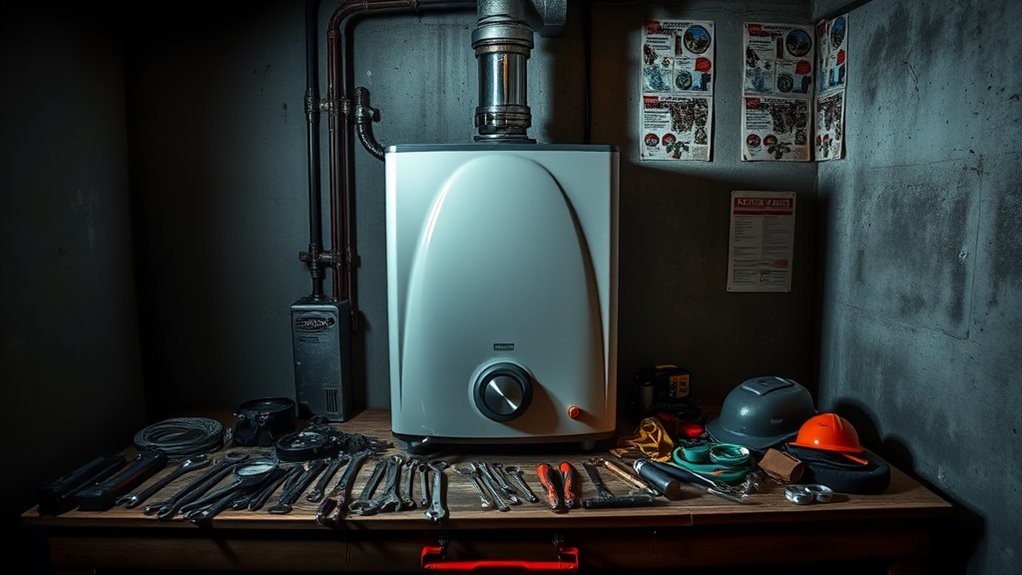It's not outright illegal to service your own boiler, but doing so poses significant risks. Strict regulations govern boiler servicing, especially for gas boilers, requiring qualified professionals to handle specific tasks. If you don't comply, you could face penalties or void your warranty. Safety issues, such as carbon monoxide leaks, may arise from improper maintenance. It's advisable to understand these regulations and considerations thoroughly if you want to guarantee safe and efficient boiler operation.
Key insights
- Servicing your own boiler can be legal, but specific regulations may restrict certain tasks to licensed professionals, especially for gas boilers.
- Non-compliance with manufacturer maintenance schedules can void warranties and lead to legal penalties.
- In some regions, only certified technicians are permitted to perform specific boiler servicing tasks, impacting legality.
- DIY servicing may increase risks of carbon monoxide leaks and malfunctions, raising safety concerns beyond legality.
- Always check local regulations and manufacturer guidelines to ensure compliance when considering DIY boiler servicing.
Understanding Boiler Regulations
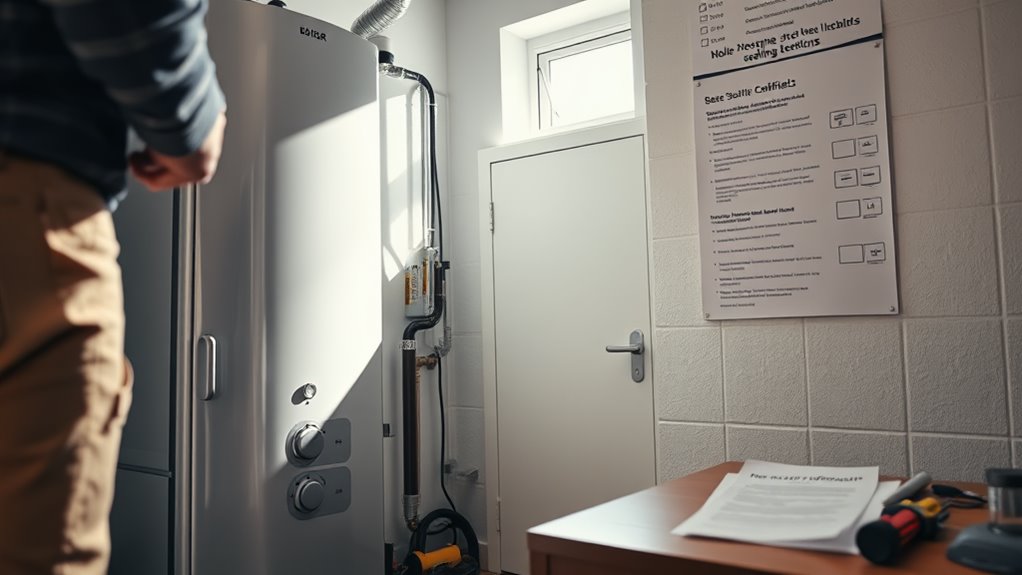
When you consider servicing your own boiler, it's vital to understand the regulations governing such actions. Different boiler types, such as combi, system, and conventional boilers, have specific rules regarding maintenance and servicing. In many regions, only qualified professionals can legally perform certain tasks, particularly on gas boilers, due to safety and efficiency concerns. You'll also need to adhere to strict maintenance schedules outlined by the manufacturer. Failing to comply with these regulations can lead to penalties and void warranties. Understanding these requirements is essential not just for legality but also for ensuring the safety and longevity of your heating system. Always review local laws and manufacturer guidelines before attempting any servicing yourself, as a Commercial Gas Safety Certificate is necessary for businesses using gas appliances to confirm compliance and safety.
The Importance of Professional Servicing
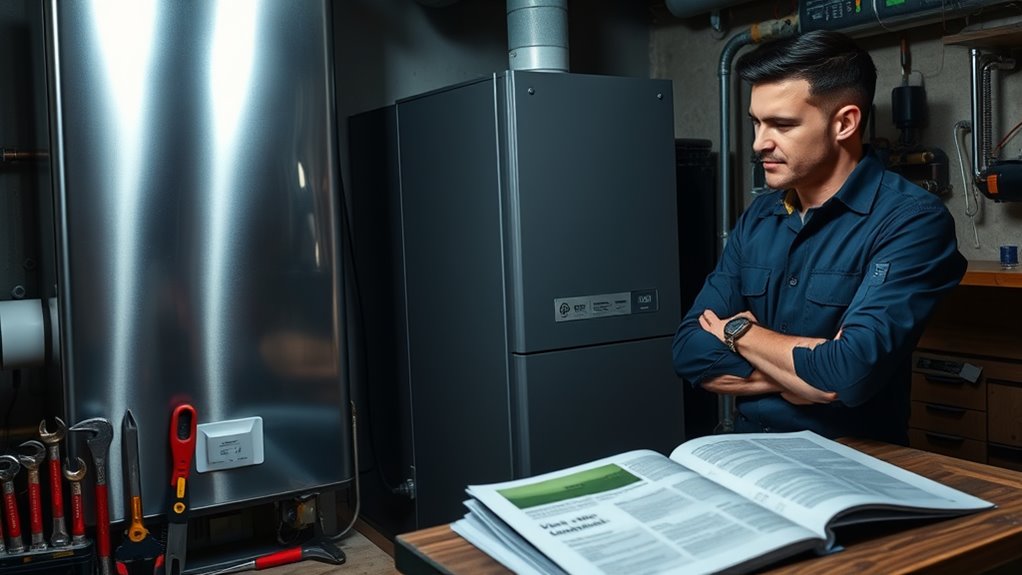
While you might feel confident in your ability to handle basic maintenance, professional servicing of your boiler is vital for guaranteeing peak performance and safety. Technicians bring professional expertise that goes beyond routine maintenance tasks. They conduct thorough inspections, identifying issues that may not be apparent to an untrained eye. This includes checking for gas leaks, evaluating pressure levels, and making certain that all components function efficiently. Regular servicing not only prolongs your boiler's lifespan but also enhances energy efficiency, saving you money in the long run. Additionally, professional servicing guarantees compliance with safety regulations, protecting you and your home from potential hazards. Prioritizing expert assistance is essential for maintaining a reliable and safe heating system. Moreover, routine servicing helps prevent costly repairs by identifying minor issues early, ensuring your boiler continues to operate efficiently.
Risks of DIY Boiler Servicing
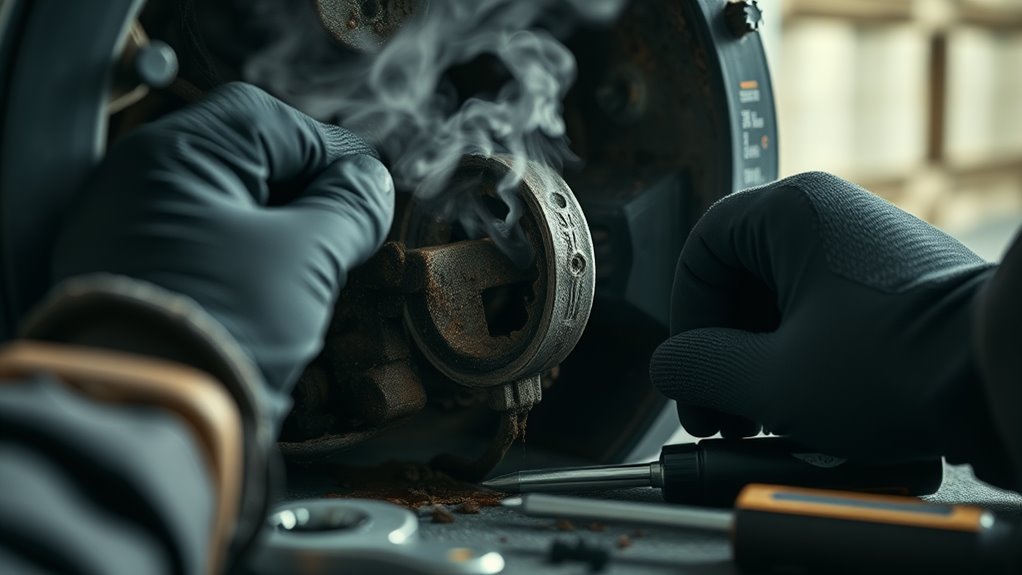
Attempting DIY boiler servicing can expose you to significant risks, especially if you lack proper training and knowledge. Ignoring these DIY hazards can lead to serious consequences, affecting both your safety and the efficiency of your heating system. Here are a few essential risks to evaluate:
- Carbon monoxide leaks: Incomplete combustion may cause deadly gas to accumulate in your home.
- Improper repairs: Faulty fixes can result in boiler malfunctions, leading to costly repairs or replacements.
- Personal injury: Handling complex machinery without expertise increases the chance of accidents.
Additionally, regular maintenance is vital for safe operation, as it ensures systems meet current safety and environmental standards. If you're unsure about any aspect of servicing, it's always best to consult a qualified professional to mitigate these risks effectively.
Legal Implications of Self-Servicing
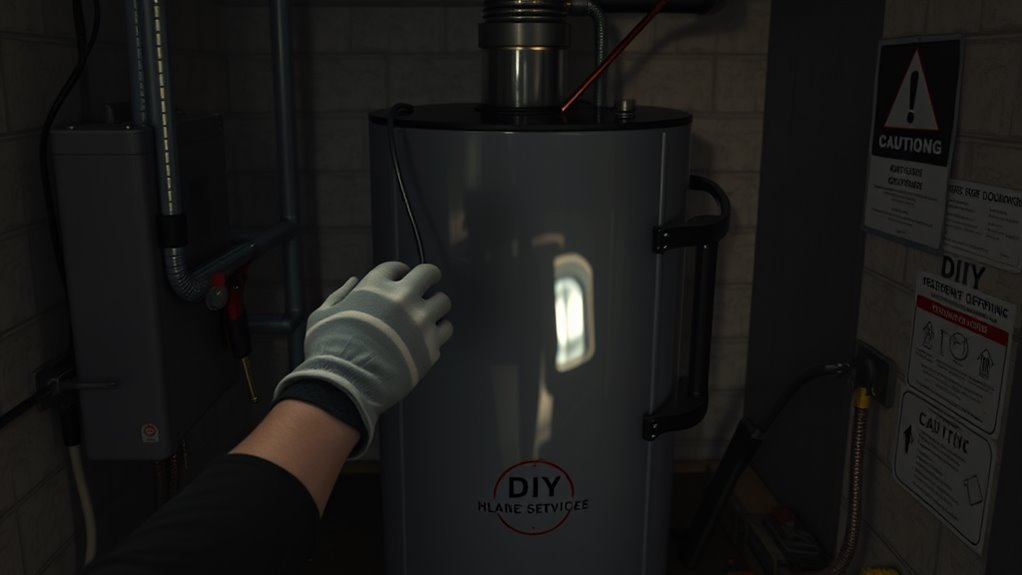
When you consider servicing your own boiler, it's essential to understand the legal implications involved. You need to be aware of licensing requirements, guarantee compliance with safety regulations, and recognize how self-servicing might affect your insurance coverage. Ignoring these factors could lead to serious legal and financial consequences. Additionally, compliance with safety regulations is crucial to mitigate risks associated with gas appliances.
Licensing Requirements Overview
To guarantee compliance with local regulations, it is crucial to understand the licensing requirements associated with servicing your own boiler. Different regions have specific licensing categories, and failing to adhere to these can lead to legal issues.
Here's what you should consider in the certification process:
- Types of Licenses: Familiarize yourself with the various licenses required for different boiler types.
- Training Requirements: Understand the training or courses necessary to obtain the appropriate certification.
- Renewal and Compliance: Be aware of how often you need to renew your license and stay updated with any regulatory changes. Regular maintenance protects investments in equipment, keeping boilers, HVAC systems, and pumps in optimal condition while reducing wear and tear.
Safety Regulations Compliance
While you might feel confident in handling your own boiler maintenance, it's essential to understand the safety regulations that govern self-servicing. Compliance with safety standards is paramount to guarantee both your safety and the proper functioning of your boiler. Various regulations dictate how maintenance should be performed, including the necessary precautions to avoid hazards such as gas leaks or carbon monoxide poisoning. Familiarize yourself with local and national codes that apply to your boiler type. Failure to adhere to these regulations can lead to legal repercussions, including fines and liability for accidents. Always prioritize regulatory compliance to safeguard your home and assure that your maintenance practices align with industry standards. Your diligence can mean the difference between safe operation and serious risks. Additionally, consider the benefits of energy-efficient heating systems, which can enhance safety and reduce operational costs.
Insurance Implications Explained
Understanding safety regulations is only part of the equation when it comes to self-servicing your boiler; insurance implications also play a significant role. If you choose to service your own boiler, consider the following points regarding insurance coverage and liability concerns:
- Many insurance policies may not cover damages resulting from unauthorized servicing.
- You could face increased liability if an incident occurs due to improper maintenance.
- Insurers often require proof of professional servicing to maintain coverage.
- Regular maintenance helps prevent error codes that could lead to costly repairs or safety hazards.
Before proceeding, review your policy and consult with your insurer. Self-servicing might save costs upfront, but it could lead to significant financial repercussions if something goes wrong. Always weigh the risks against the potential benefits.
When to Call a Professional
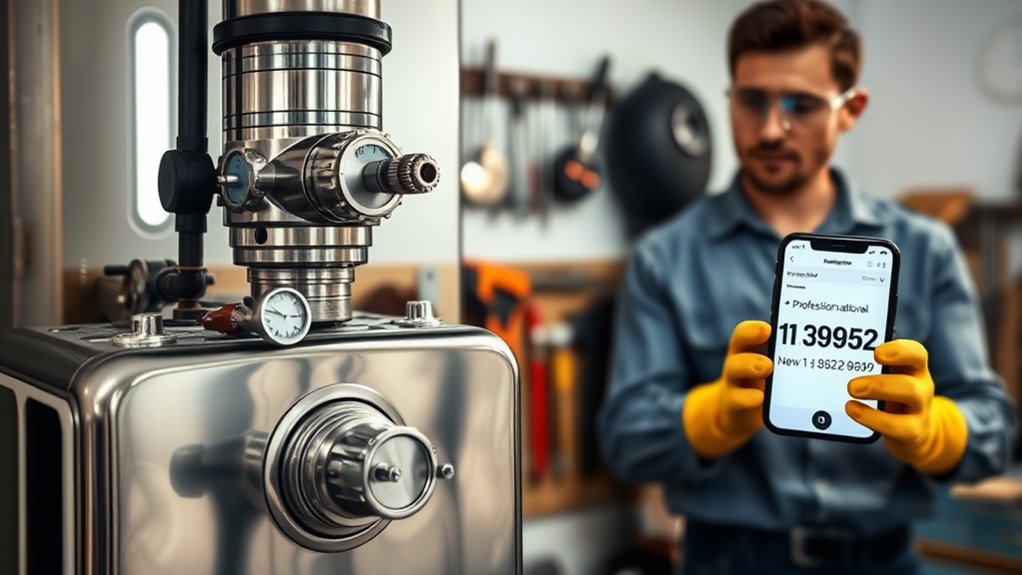
When servicing your boiler, it's vital to know when to call a professional. If you're unsure about safety regulations, face complex repair needs, or risk voiding your warranty, professional assistance is necessary. Addressing these factors can help guarantee your boiler operates safely and efficiently. Additionally, understanding error codes can significantly enhance your ability to troubleshoot minor issues before seeking professional help.
Safety Regulations Compliance
If you're considering servicing your own boiler, it's vital to recognize the specific safety regulations that govern such work. Not adhering to these regulations can lead to serious hazards. Here are key aspects to keep in mind:
- Safety Standards: Make certain your work meets local and national safety standards to prevent accidents.
- Compliance Checks: Regularly conduct compliance checks to verify that all components are functioning properly.
- Professional Help: If you encounter any uncertainty or complexity, don't hesitate to call a qualified professional. Regular inspections by qualified engineers can help identify issues early and prevent errors like E1.
Understanding these elements is important for maintaining a safe environment. Ignoring safety regulations could not only jeopardize your safety but also result in legal consequences. Always prioritize compliance and safety when dealing with your boiler.
Complex Repair Needs
Though servicing a boiler might seem straightforward, certain complex repair needs require the expertise of a professional. If you encounter issues like persistent leaks, unusual noises, or inconsistent heating, it's time to call in an expert. These problems often involve complex repair techniques that go beyond basic maintenance. Professionals possess the necessary tools and knowledge to diagnose issues accurately using advanced troubleshooting methods. Attempting to manage these repairs without proper training can lead to further damage or safety risks. Remember, when dealing with gas lines, electrical components, or intricate boiler systems, it's essential to prioritize safety and efficiency. If you're unsure, don't hesitate to seek help from a qualified technician to guarantee your boiler operates correctly and safely, especially when dealing with E37 error codes that indicate potential sensor malfunctions.
Warranty Considerations
Understanding the implications of your boiler's warranty is essential, as attempting to service it yourself can void that warranty. If you're considering a DIY approach, be aware of the following:
- Warranty Voiding: Many manufacturers require professional servicing to maintain the warranty.
- Service Records: Keep a detailed log of any professional maintenance performed to guarantee compliance with warranty terms.
- Complex Repairs: If your boiler needs intricate repairs, it's best to call a professional to avoid damaging the unit.
Tips for Finding a Qualified Technician
Finding a qualified technician to service your boiler is essential for guaranteeing ideal performance and safety. Start by checking online reviews, as they provide valuable insights into a technician's reliability and expertise. Look for feedback from previous customers to gauge their satisfaction levels. Next, verify technician credentials, including licenses, certifications, and insurance. A qualified technician should be familiar with the specific type of boiler you own and adhere to local regulations. Don't hesitate to ask for references or examples of previous work. Finally, consider obtaining multiple quotes to guarantee you're getting a fair rate. By following these tips, you'll increase your chances of finding a skilled professional who can effectively address your boiler needs.
Frequently Asked Questions
Can I Legally Repair My Boiler if I'm Not a Certified Technician?
You can legally repair your boiler if you're not a certified technician, but you must understand your legal responsibilities and the importance of boiler safety. Many jurisdictions allow homeowners to perform their own repairs, yet improper handling can lead to dangerous situations. It's essential to familiarize yourself with local regulations and best practices to guarantee safe operation. If in doubt, consulting with a professional is always a wise choice for your peace of mind.
What Are Common Boiler Issues I Can Safely Fix Myself?
Common boiler issues you can safely fix include minor boiler leaks and pressure issues. For leaks, check the connections and tighten any loose fittings. If your boiler's pressure is too low, you can add water through the filling loop. Always refer to your manufacturer's manual for specific instructions. Remember, while you can handle these minor repairs, more complex issues should be left to certified professionals to guarantee safety and compliance.
How Often Should My Boiler Be Serviced by a Professional?
You should schedule professional service for your boiler at least once a year to guarantee peak performance. This boiler maintenance frequency helps identify potential issues before they escalate and keeps your system running efficiently. Professional service benefits include thorough inspections, safety checks, and expert repairs that you might not be equipped to handle on your own. Regular servicing not only extends your boiler's lifespan but also enhances energy efficiency and reduces the risk of breakdowns.
Are There Any Warranties Affected by DIY Boiler Servicing?
When you consider DIY boiler servicing, be aware of the potential warranty limitations. Most manufacturers require professional servicing to keep warranties valid. If you attempt repairs or maintenance yourself, you might void the warranty, leaving you responsible for costly repairs. It's essential to review your warranty terms carefully. Understanding these DIY implications can save you from unexpected expenses and guarantee your boiler remains covered under its warranty for any future issues.
What Tools Do I Need for Basic Boiler Maintenance?
For basic boiler maintenance, you'll need several essential boiler tools. Start with a pressure gauge to monitor system pressure. A multimeter helps check electrical components, while a flue gas analyzer guarantees proper combustion. Don't forget a socket set for tightening connections and a vacuum for cleaning. Follow your maintenance checklist to make certain no steps are missed. Keeping these tools handy will make your maintenance tasks efficient and effective.
Summary
In summary, while you might be tempted to service your own boiler, it's essential to understand the legal and safety implications. Improper handling can lead to serious risks, including hazards to your health and home. Always prioritize professional servicing to guarantee compliance with regulations and maintain efficiency. If you're unsure or inexperienced, don't hesitate to call a qualified technician. It's the safest choice for your boiler's longevity and your peace of mind.

